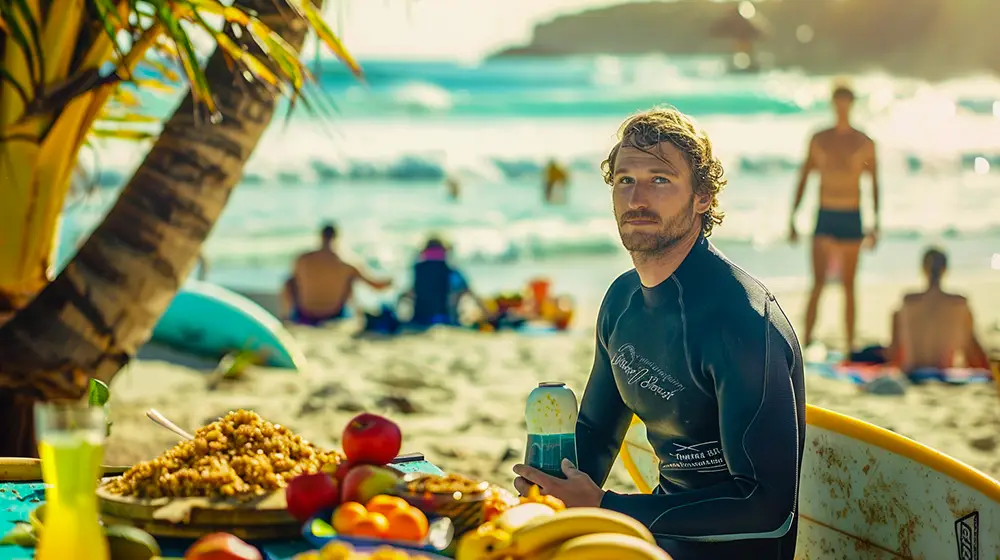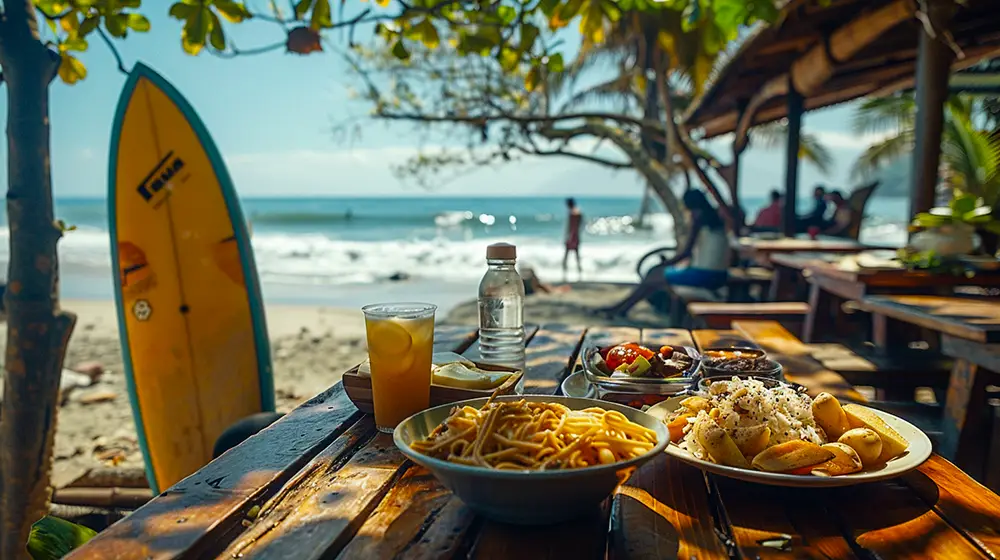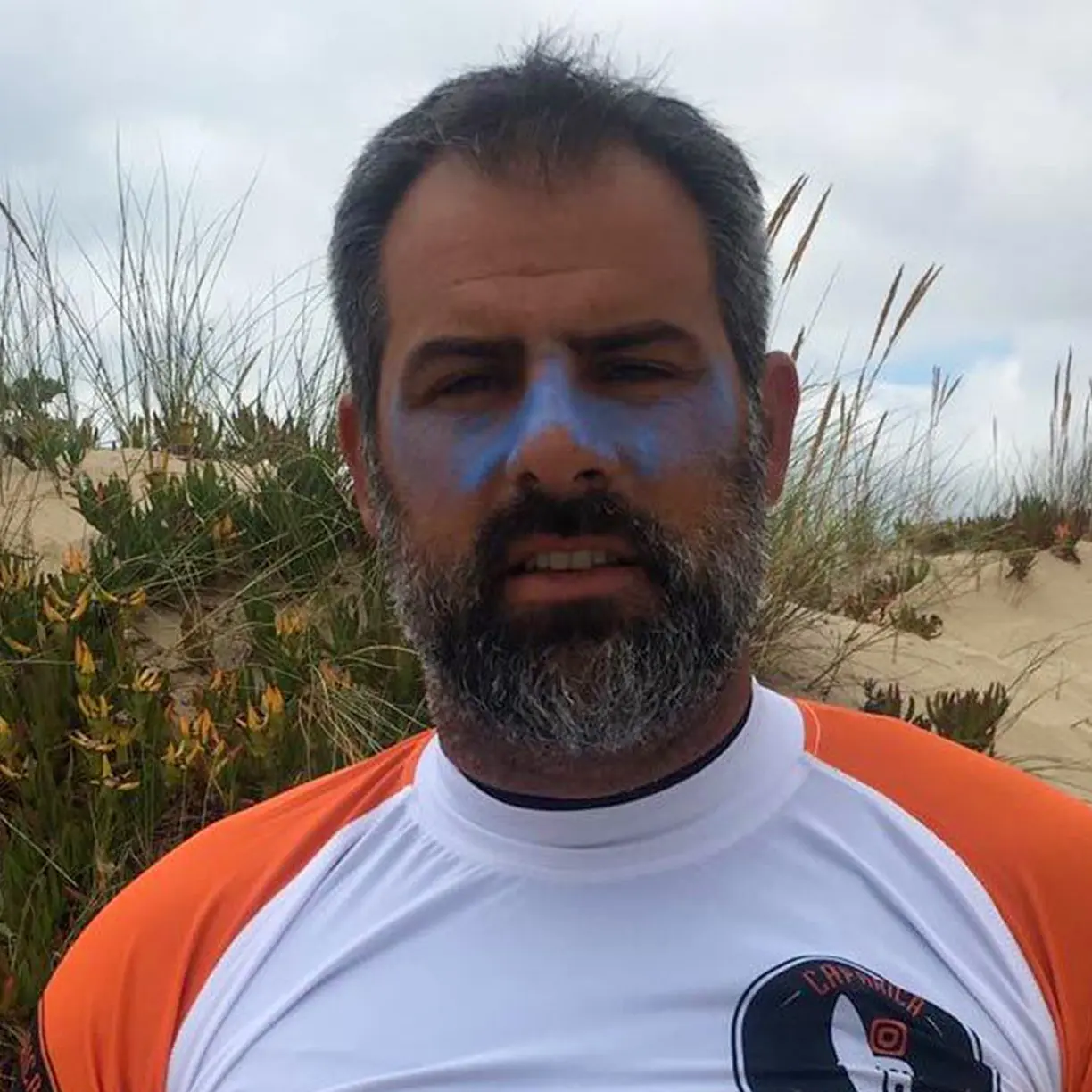Surfers require high-energy diets, given the physical demands of surfing which include paddling strength, balance, and endurance. A study by the Sports Nutrition Journal (2023) highlights that a diet rich in carbohydrates can improve endurance by up to 20% in athletes, including surfers. For instance, foods such as whole grains (e.g., brown rice, oatmeal) and fruits (e.g., bananas, apples) are essential. These carbohydrate-rich foods offer the necessary fuel surfers need for long sessions in the water. Professional surfer João Rodrigues attests to the benefits of such a diet, noting significant improvements in his stamina and performance.
Protein intake aids in muscle repair and recovery for surfers. Foods high in protein like chicken, fish (examples include salmon, tuna), and legumes (such as lentils and chickpeas) are crucial. Studies suggest that surfers should aim to consume 1.2 to 1.7 grams of protein per kilogram of body weight daily to facilitate muscle recovery and growth. Including protein-rich foods in your diet will help repair muscles after the rigors of surfing, ensuring faster recovery times.
Hydration plays a key role in a surfer’s performance, with water being the optimal choice for maintaining hydration levels. It is recommended that surfers drink at least 2 liters of water daily, increasing intake before and after sessions to compensate for fluid loss through sweat. Electrolyte-rich beverages can also benefit surfers by replenishing salts lost during intense physical activity. A study found that coconut water, rich in electrolytes, is particularly effective for hydration.
Essential Nutritional Foundations for Surfers
What are the cornerstones of a surfer’s diet?
Proteins, carbohydrates, and fats serve as the pillars. These macronutrients support muscle repair, energy provision, and inflammation reduction. For instance, lean meats, legumes, and tofu supply essential amino acids for muscle synthesis. Complex carbohydrates from sources like sweet potatoes and whole grains ensure sustained energy. Omega-3 rich fats from avocados and salmon reduce muscle soreness.
Carbohydrate Loading Pre-Surf: Maximizing Stamina
Why is carbohydrate loading vital before hitting the waves?
Carbohydrate loading maximizes energy reserves in muscles, extending endurance during lengthy surfing sessions. Surfers benefit from this practice by having increased stamina, allowing them to ride waves longer and recover faster between sets. Foods like pasta, rice, and potatoes serve as excellent sources of carbohydrates, replenishing glycogen stores effectively.
How soon should surfers consume carbohydrates before their session?
Ideally, eating a carbohydrate-rich meal 3-4 hours before surfing ensures optimal digestion and energy availability. This timing helps in avoiding the discomfort of surfing on a full stomach while ensuring the muscles are primed with energy. Oats, bananas, and whole grain breads provide quick yet sustained energy release, supporting both short explosive efforts and longer endurance needs in the water.
What type of carbohydrates best support stamina in surfing?
Complex carbohydrates offer prolonged energy release, crucial for enduring multiple hours in the surf. Unlike simple sugars that lead to rapid spikes and drops in blood sugar levels, complex carbohydrates maintain stable energy levels. Quinoa, legumes, and sweet potatoes not only supply the necessary fuel but also contain fibers that aid in gradual absorption, keeping surfers powered for the duration of their session.
Hydration Strategies for Peak Performance on the Waves
Why is hydration pivotal for surfers?
- Essential fluids lost during surfing get replenished through proper hydration.
- Water serves as the body’s coolant, preventing overheating.
- Electrolyte balance, maintained by beverages such as sports drinks, aids in preventing cramps and fatigue.
How can surfers ensure they stay adequately hydrated?
Starting the day with a substantial amount of water sets a positive hydration baseline. Rehydration involves more than just water; coconut water and electrolyte-infused drinks offer minerals like potassium and sodium for rapid recovery. Sipping small amounts frequently surpasses gulping large volumes sporadically to optimize absorption and sustain fluid levels.
What risks do dehydrated surfers face?
Dehydration impairs cognitive functions, leading to poor decision-making on the waves. Muscles deprived of adequate hydration experience early fatigue and reduced power, thwarting performance. The body’s cooling mechanism fails without enough fluids, increasing the risk of heatstroke even in cooler water temperatures.
Practical Hydration Tip: Post-Surf Recovery Drink
After a surfing session, consider drinking a mix of coconut water and a pinch of sea salt. This combination replenishes lost electrolytes and supports quick recovery.
Protein Intake and Muscle Recovery Post-Surf
Why is protein intake crucial after surfing?
Protein aids in muscle repair and recovery, ensuring that surfers can return to the waves stronger. Foods rich in protein, like chicken breasts and tofu, provide the necessary building blocks for muscle synthesis. Conversely, neglecting protein intake could lead to prolonged soreness and delayed recovery times.
How much protein do surfers need for optimal recovery?
The amount varies depending on body weight and surfing intensity. Athletes engaging in vigorous activities may require between 1.2 to 2.0 grams of protein per kilogram of body weight daily. Choices such as eggs, legumes, and fish serve as excellent sources, catering to both omnivores and vegetarians alike.
What are the best times to consume protein for enhancing muscle recovery?
Immediately following a surfing session maximizes muscle repair, with a window of about 30 to 45 minutes being critical. Meals or snacks high in protein content, including whey protein shakes or a quinoa salad, can expedite the repair process. On the contrary, delaying protein intake can significantly slow down muscle recovery.
In terms of effectiveness, whey protein shakes offer more rapid absorption rates than whole food options such as steak or lentils, ensuring quicker delivery of amino acids to damaged muscles. Greek yogurt stands out for its balance of carbohydrates and proteins, facilitating a more comprehensive recovery than carbohydrate-rich foods like bread alone. Combining multiple protein sources throughout the day ensures a steady supply of amino acids, making it more advantageous for sustained muscle repair than relying on a single large protein meal.
Vitamin and Mineral Essentials for Surfers
Why do surfers need a robust intake of vitamins and minerals?
These nutrients are fundamental for energy production, muscle repair, and immune system support. For example, vitamins such as B12 and C are crucial for converting food into energy and repairing tissues. Minerals like magnesium and zinc play key roles in muscle function and wound healing. Without adequate levels, surfers might experience fatigue quicker, recover slower from injuries, and have a higher susceptibility to illnesses.
Iron and Potassium: Key Minerals
Iron deficiency can lead to anemia, characterized by extreme fatigue and weakness. Foods rich in iron include spinach and red meat. Potassium, found in bananas and sweet potatoes, helps prevent muscle cramps during long sessions of physical exertion on the water. Skimping on these minerals can drastically impair a surfer’s stamina and agility.
Professional Surfer Testimonial: Jane Dorothy
Jane Dorothy, a professional surfer, shared her experience on how focusing on a diet rich in iron and potassium improved her performance. “Incorporating spinach and bananas into my daily meals has significantly reduced muscle cramps and enhanced my overall endurance on the waves,” she noted.
Managing Energy Levels Through Smart Snacking
Why should surfers pay attention to their snacking habits?
Smart snacking can significantly enhance energy levels. Foods high in protein, such as nuts and seeds, offer sustained energy, unlike sugary snacks which lead to quick spikes and subsequent crashes. Consuming almonds, walnuts, or pumpkin seeds provides essential nutrients, aiding muscle repair and growth.
Ideal Snacks for Surfing Sessions
High-fiber options like fruits and whole grain crackers are key. These selections ensure a steady release of energy, keeping surfers active and alert on the waves. Bananas and apples, paired with whole grain toast or oatmeal, supply both immediate and lasting fuel for the body.
Practical Tip: Pre-Surf Snack Routine
To optimize performance, consider having a snack of whole grain crackers with almond butter 30 minutes before heading out. This combination provides both quick-release and sustained energy, ensuring you’re ready to tackle the waves.
Anti-Inflammatory Foods for Injury Prevention and Recovery
Why should surfers focus on anti-inflammatory foods?
These dietary choices play a crucial role in injury prevention and accelerate recovery. Foods rich in omega-3 fatty acids, such as salmon, walnuts, and chia seeds, reduce inflammation. Turmeric and ginger, known for their anti-inflammatory properties, mitigate pain akin to over-the-counter anti-inflammatories. Leafy greens like spinach and kale bolster the body’s defense against stressors that cause inflammation.
What specific nutrients support the body’s healing process?
Vitamins C and E act as powerful antioxidants, enhancing the body’s ability to repair itself. Citrus fruits, strawberries, and almonds are abundant sources of these vitamins. They counteract free radical damage, supporting cellular recovery post-surf sessions. Zinc plays a pivotal role in wound healing and immune function, with pumpkin seeds and legumes as prime sources.
How do anti-inflammatory foods influence long-term health for surfers?
Consistent consumption aids in maintaining joint health and flexibility, crucial for maneuvering waves. These foods diminish the risk of chronic inflammation linked to numerous diseases, such as arthritis and heart disease. By incorporating berries, whole grains, and nuts into their diet, surfers ensure their bodies remain resilient against both acute injuries and long-term health issues.
Optimizing Body Composition for Surfing Excellence
Why is lean muscle mass crucial for surfers?
It enhances agility, balance, and endurance. Surfers benefit from increased lean muscle, as it supports swift movements, stabilizes them on their boards, and prolongs their ability to ride waves without fatigue. Conversely, excess fat impedes performance by reducing buoyancy and flexibility.
How can surfers adjust their diets to optimize body composition?
Increasing protein intake is key. Foods like chicken breasts, legumes, and tofu repair and build muscle fibers after rigorous sessions. Simultaneously, reducing consumption of processed foods and sugars prevents unnecessary fat gain. Hydration plays a pivotal role too; water flushes toxins and aids in muscle recovery.
What role do vitamins and minerals play in achieving optimal body composition?
They are indispensable for metabolic efficiency. Magnesium, found in almonds and spinach, facilitates muscle function and energy production. Iron, present in lentils and beef, boosts oxygen transport to muscles, enhancing endurance. Calcium strengthens bones, allowing surfers to withstand the physical demands of the sport.
Lean muscle mass yields better performance than higher fat percentages; surfers exhibit more endurance with the former. Foods rich in protein offer more significant benefits for muscle repair than those high in simple sugars which primarily contribute to fat storage. Proper hydration not only improves metabolic rates but also ensures more efficient recovery than dehydration allows.
The Role of Omega-3s in Enhancing Flexibility and Endurance
Why do omega-3s matter for surfers?
Omega-3 fatty acids, crucial for maintaining joint health, significantly improve flexibility. Foods rich in omega-3s, such as salmon, chia seeds, and walnuts, lubricate the joints. This lubrication decreases stiffness and increases range of motion, enabling surfers to execute more fluid maneuvers on the waves.
How do omega-3 fatty acids enhance endurance?
These nutrients fight inflammation and fatigue, two major barriers to prolonged physical activity. Supplements like fish oil or plant-based options such as flaxseed oil boost the body’s endurance levels. As a result, surfers experience less muscle soreness and quicker recovery times post-surfing sessions.
Can omega-3 intake impact mental focus on the waves?
Yes, these fatty acids support brain health, enhancing cognitive functions critical for surfing success. Foods like mackerel, hemp seeds, and algae oil sharpen concentration and decision-making skills. Surfers benefit from increased mental clarity, enabling them to better anticipate wave patterns and maintain balance on their boards.
Surfers who prioritize omega-3 intake exhibit greater agility than those who neglect this nutrient, owing to superior joint flexibility. Their stamina outlasts counterparts with lower omega-3 consumption due to enhanced muscle recovery and reduced inflammation. Moreover, their acute focus outshines individuals deficient in these essential fats, leading to improved performance and safety during surfing endeavors.
Tailoring Your Surfing Diet: Seasonal Considerations
Do winter waves dictate a different dietary approach?
Absolutely. Cold water surfing demands higher calorie intake, as shivering and battling the elements burn significant energy. Foods rich in healthy fats, such as avocados, nuts, and seeds, become crucial. These sources provide sustained energy, helping to maintain core body warmth and endurance in chilly waters.
Does the summer surf season alter nutritional needs?
Indeed. Hydration takes precedence due to increased sweating under the sun. Watermelon, cucumbers, and strawberries serve as perfect snacks, offering both hydration and quick-release sugars for instant energy boosts. Electrolyte replenishment is vital, with coconut water and bananas providing potassium and sodium to prevent cramps.
Are there benefits in aligning meals with tidal movements?
Unquestionably. High-tide sessions might demand light yet energizing foods like oatmeal or yogurt topped with berries and honey for quick digestion and energy. Low-tide outings could lean on more substantial meals such as grilled chicken or fish with quinoa and vegetables to ensure satiety over extended periods in the water.
Surfers riding cold currents tend to consume more calories than their warm-water counterparts, focusing on fat-rich foods versus hydrating fruits. This dietary shift ensures they can withstand lower temperatures without sacrificing performance. Summer surfers prioritize fluids and electrolytes to combat dehydration, reflecting the necessity of adapting diet to environmental conditions for peak physical condition.




